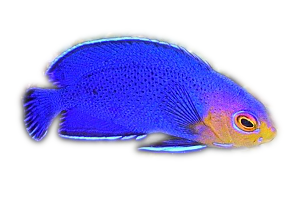
By Bob Goemans

Ken Uy's Aquarium
Note to viewers: All photos courtesy of Greg Rothschild (www.gregrothschild.com). For far more information about Ken's aquarium, visit his website at: http://kensreef.tripod.com/reef2.htm
HISTORY
Owners Name: Ken Uy
Location: California, USA
Year the tank was set up: 1995
Size and Volume of the Tank: 30" x 12" x 18" - 29 gallon glass tank
Sump Size: 10 gallon glass tank
Refugium: Called a "propagation tray" - plastic sweater box 12" x 6" x 16"
Algae Tank: 2.5 gallons
Sand Type/Depth: 2" silica and aragonite sand
EQUIPMENT
Main system pumps: MAG 700
Additional pumps: Two MaxiJet 1000
Protein Skimmers: Turboflotor 1000
Hang-on Overflow: Amiracle
Wavemakers: Sandpoint
Heater: VisiTherm
LIGHTING
Lamps: Four 4' 40W Coralife 50/50 and 10K fluorescent lamps (extend over edge of aquarium) and one 96W 6700K fluorescent shared by main tank and propagation tank. One 18W compact and one 15W regular fluorescent lamp over algae tank.
Photoperiod: 8PM - 6AM
CHEMISTRY
Water Temperature: 78 - 82°F
Specific Gravity: 1.026
PH: Not tested
Calcium:Not tested
Redox: Not tested
Alkalinity: Not tested
Nitrate: Not tested
Additives: Mrs. Wage's Pickling Lime (tablespoon per gallon to makeup water)
RO/DI water: RO - yes, DI - no
FEEDING
Frozen mysis in morning when lights are out to feed Tubastrea and shrimp. Brine Shrimp Direct brine shrimp flakes or Vibragro pellets in evening when lights are on. Mushrooms, LPS corals, and the anemone are target fed with pieces of shrimp every week or so. Also, occasionally doses with a bit of algae cryopaste.
GENERAL HUSBANDRY:
Front glass cleaned about once a week, and dust and salt deposits removed from covers and lights. Partial water change, about five gallons, every month. Excess algae removed weekly. Corals trimmed as needed. Protein skimmer cup emptied and cleaned when it gets full. Siphon tubes for both the overflow and propagation tray are cleaned whenever they start collecting too many bubbles.
PROBLEM AREAS
Excessive algae growth in the main tank and a massive flatworm infestation in the propagation tray. Flatworms were never able to establish themselves in the main tank as blue damsel and the watchman gobies were seen to be eating them on some occasions. The infestation in the propagation tray was cured when two Chelidonura varians were added.
COMMENTS?
Lack of space! Need a bigger tank!